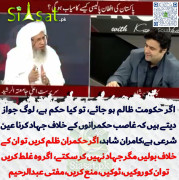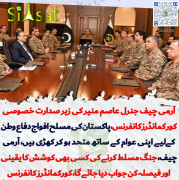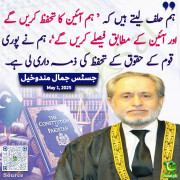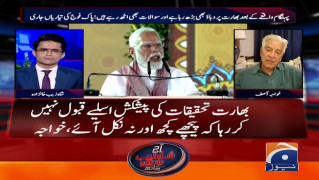You are using an out of date browser. It may not display this or other websites correctly.
You should upgrade or use an alternative browser.
You should upgrade or use an alternative browser.
The Last Sermon of Holy Prophet Muhammad (PBUH)
- Thread starter Serving Islam
- Start date
hans
Banned
Quran 5:67
Sahih International
O Messenger, announce that which has been revealed to you from your Lord, and if you do not, then you have not conveyed His message. And Allah will protect you from the people. Indeed, Allah does not guide the disbelieving people.
Pickthall
O Messenger! Make known that which hath been revealed unto thee from thy Lord,for if thou do it not, thou wilt not have conveyed His message. Allah will protect thee from mankind. Lo! Allah guideth not the disbelieving folk.
Yusuf Ali
O Messenger! proclaim the (message) which hath been sent to thee from thy Lord. If thou didst not, thou wouldst not have fulfilled and proclaimed His mission. And Allah will defend thee from men (who mean mischief). For Allah guideth not those who reject Faith.
O Messenger, announce that which has been revealed to you from your Lord, and if you do not, then you have not conveyed His message. And Allah will protect you from the people. Indeed, Allah does not guide the disbelieving people.
Pickthall
O Messenger! Make known that which hath been revealed unto thee from thy Lord,for if thou do it not, thou wilt not have conveyed His message. Allah will protect thee from mankind. Lo! Allah guideth not the disbelieving folk.
Yusuf Ali
O Messenger! proclaim the (message) which hath been sent to thee from thy Lord. If thou didst not, thou wouldst not have fulfilled and proclaimed His mission. And Allah will defend thee from men (who mean mischief). For Allah guideth not those who reject Faith.
Pakistani1947
Chief Minister (5k+ posts)
The Final Sermon of Prophet Muhammad (صلی اللہ علیہ وآلہ وسلم):
After praising, and thanking God, the Prophet, may God send His praises upon him said:
O People, lend me an attentive ear, for I know not whether after this year, I shall ever be amongst you again. Therefore, listen to what I am saying to you very carefully and take these words to those who could not be present here today.
O People, just as you regard this month, this day, this city as Sacred, so regard the life and property of every Muslim as a sacred trust. Return the goods entrusted to you to their rightful owners. Hurt no one so that no one may hurt you. Remember that you will indeed meet your Lord, and that He will indeed reckon your deeds. God has forbidden you to take usury (interest), therefore all interest obligation shall henceforth be waived. Your capital, however, is yours to keep. You will neither inflict nor suffer any inequity. God has Judged that there shall be no interest, and that all the interest due to Abbas ibn Abdal Muttalib shall henceforth be waived...
Beware of Satan, for the safety of your religion. He has lost all hope that he will ever be able to lead you astray in big things, so beware of following him in small things.
O People, it is true that you have certain rights with regard to your women, but they also have rights over you. Remember that you have taken them as your wives only under a trust from God and with His permission. If they abide by your right then to them belongs the right to be fed and clothed in kindness. Do treat your women well and be kind to them for they are your partners and committed helpers. And it is your right that they do not make friends with any one of whom you do not approve, as well as never to be unchaste.
O People, listen to me in earnest, worship God, perform your five daily prayers, fast during the month of Ramadan, and offer Zakat. Perform Hajj if you have the means.
All mankind is from Adam and Eve. An Arab has no superiority over a non-Arab, nor does a non-Arab have any superiority over an Arab; white has no superiority over black, nor does a black have any superiority over white; [none have superiority over another] except by piety and good action. Learn that every Muslim is a brother to every Muslim and that the Muslims constitute one brotherhood. Nothing shall be legitimate to a Muslim which belongs to a fellow Muslim unless it was given freely and willingly. Do not, therefore, do injustice to yourselves.
Remember, one day you will appear before God and answer for your deeds. So beware, do not stray from the path of righteousness after I am gone.
O People, no prophet or apostle will come after me, and no new faith will be born. Reason well, therefore, O people, and understand words which I convey to you. I leave behind me two things, the Quran and my example, the Sunnah, and if you follow these you will never go astray.
All those who listen to me shall pass on my words to others and those to others again; and may the last ones understand my words better than those who listen to me directly. Be my witness oh Allah that I have conveyed your message to your people
:jazak: Brother serving Islam for reminding us the final message of Prophet Muhammad (صلی اللہ علیہ وآلہ وسلم). Most of us has forgotten this message. The faith of Sahabah (رَّضِيَ اللَّهُ عَنْهُمْ) was Quran and Sunnah ONLY, not Sufism, Qadrism, Naqshbandism, Chushtism or any other sect.
O ye who believe! Obey Allah, and obey the Messenger, and those charged with authority among you. If ye differ in anything among yourselves, refer it to Allah and HisMessenger, if ye do believe in Allah and the Last Day: That is best, and most suitable for final determination.(Quraan, 4:59)
:
اے ایمان والو الله کی فرمانبرداری کرو اور رسول کی فرمانبرداری کرو اور ان لوگوں کی جو تم میں سے حاکم ہوں پھراگر آپس میں کوئی چیز میں جھگڑا کرو تو اسے الله اور اس کے رسول کی طرف پھیرو اگر تم الله اور قیامت کے دن پر یقین رکھتے ہو یہی بات اچھی ہے اور انجام کے لحاظ سے بہت بہتر ہے
A Muslim always refers back to the Quran and authentic narrations of Prophet Muhammad (صلی اللہ علیہ وآلہ وسلم) called the Sunnah, in matters of religion. Allah tells us in the Quran: It is not for a believing man or a believing woman, when God and His Messenger have decided a matter, they should [thereafter] have any choice about their affair. And whoever disobeys God and His Messenger has certainly strayed into clear error. (Quran 33:36)
Prophet Muhammad ( صلی اللہ علیہ وآلہ وسلم) stressed the importance of following the Quran and Sunnah and the danger of introducing any innovations into Islam. It is known that the Prophet said: Whoever does a deed which is not in accordance to my commands (i.e. the Islamic Law), it shall be rejected. (Saheeh Muslim)
Ibn Masood (a companion of the prophet), may God be pleased with him, said: The Messenger of God, may the blessing and mercy of God be upon him, made a straight line on the ground with his hand, then he said, This is the straight path of God. Then he made a (short) line on each side of the straight line; then he said, These (short) lines, each one has a devil inviting people to it. Then he recited the verse (of the Quran): And this is My path straight. So follow it, and do not follow (other) ways, lest they lead you away from My path. (Quran 6:153)
Saheeh: Reported by Ahmad and an-Nasaaee.
A Muslim therefore is required to obey Allah and His Messenger (صلی اللہ علیہ وآلہ وسلم). This is the highest authority in Islam. One is not to blindly follow religious leaders; rather, we as humans are required to use the faculties given to us by Allah, to think and reason.
Last edited:
modern fakir
MPA (400+ posts)
Exactly..just like any Biddah - e - Hasanah ..Which is an innovation within the limits of Quran and Sunnah is Acceptable..The problem is some people are hellbent on proving their ideology by using some hadiths and then not using other Authentic Hadiths. This SELECTIVE HADITH EXERCISE IS WRONG..Here lets see what my AKKA pbuh said about this:
It is stated in a Hadith that, He who initiates a good practice in Islam, receives its reward, as well as the reward of those who act upon it subsequently, without any deduction from their reward. And he who initiates a bad practice in Islam accumulates its sin and the sin of those who act upon it subsequently, without any deduction from their burdens.
[Mishkaat Sharif]
Imam Shafi states, "Anything which opposes (or changes) the Quran, Sunnah, Ijma (consensus) or the sayings of the Sahaba is Bidah. Any good deed which is not opposed to them is praiseworthy."
So this proves that following the Tareeqa of the Sahabah RA and the Awliyah Allah is VERY MUCH RECOMMENDED ! (bigsmile) (bigsmile)
It is stated in a Hadith that, He who initiates a good practice in Islam, receives its reward, as well as the reward of those who act upon it subsequently, without any deduction from their reward. And he who initiates a bad practice in Islam accumulates its sin and the sin of those who act upon it subsequently, without any deduction from their burdens.
[Mishkaat Sharif]
Imam Shafi states, "Anything which opposes (or changes) the Quran, Sunnah, Ijma (consensus) or the sayings of the Sahaba is Bidah. Any good deed which is not opposed to them is praiseworthy."
So this proves that following the Tareeqa of the Sahabah RA and the Awliyah Allah is VERY MUCH RECOMMENDED ! (bigsmile) (bigsmile)
:jazak: Brother serving Islam for reminding us the final message of Prophet Muhammad (صلی اللہ علیہ وآلہ وسلم). Most of us has forgotten this message. The faith of Sahabah (رَّضِيَ اللَّهُ عَنْهُمْ) was Quran and Sunnah ONLY, not Sufism, Qadrism, Naqshbandism, Chushtism or any other sect.
O ye who believe! Obey Allah, and obey the Messenger, and those charged with authority among you. If ye differ in anything among yourselves, refer it to Allah and HisMessenger, if ye do believe in Allah and the Last Day: That is best, and most suitable for final determination.(Quraan, 4:59)
: اے ایمان والو الله کی فرمانبرداری کرو اور رسول کی فرمانبرداری کرو اور ان لوگوں کی جو تم میں سے حاکم ہوں پھراگر آپس میں کوئی چیز میں جھگڑا کرو تو اسے الله اور اس کے رسول کی طرف پھیرو اگر تم الله اور قیامت کے دن پر یقین رکھتے ہو یہی بات اچھی ہے اور انجام کے لحاظ سے بہت بہتر ہے
A Muslim always refers back to the Quran and authentic narrations of Prophet Muhammad (صلی اللہ علیہ وآلہ وسلم) called the Sunnah, in matters of religion. Allah tells us in the Quran: It is not for a believing man or a believing woman, when God and His Messenger have decided a matter, they should [thereafter] have any choice about their affair. And whoever disobeys God and His Messenger has certainly strayed into clear error. (Quran 33:36)
Prophet Muhammad ( صلی اللہ علیہ وآلہ وسلم) stressed the importance of following the Quran and Sunnah and the danger of introducing any innovations into Islam. It is known that the Prophet said: Whoever does a deed which is not in accordance to my commands (i.e. the Islamic Law), it shall be rejected. (Saheeh Muslim)
Ibn Masood (a companion of the prophet), may God be pleased with him, said: The Messenger of God, may the blessing and mercy of God be upon him, made a straight line on the ground with his hand, then he said, This is the straight path of God. Then he made a (short) line on each side of the straight line; then he said, These (short) lines, each one has a devil inviting people to it. Then he recited the verse (of the Quran): And this is My path straight. So follow it, and do not follow (other) ways, lest they lead you away from My path. (Quran 6:153)
Saheeh: Reported by Ahmad and an-Nasaaee.
A Muslim therefore is required to obey Allah and His Messenger (صلی اللہ علیہ وآلہ وسلم). This is the highest authority in Islam. One is not to blindly follow religious leaders; rather, we as humans are required to use the faculties given to us by Allah, to think and reason.
Last edited:
Pakistani1947
Chief Minister (5k+ posts)
It is stated in a Hadith that, “He who initiates a good practice in Islam, receives its reward, as well as the reward of those who act upon it subsequently, without any deduction from their reward. And he who initiates a bad practice in Islam accumulates its sin and the sin of those who act upon it subsequently, without any deduction from their burdens.”
[Mishkaat Sharif]
Imam Shafi states, "Anything which opposes (or changes) the Quran, Sunnah, Ijma (consensus) or the sayings of the Sahaba is Bidah. Any good deed which is not opposed to them is praiseworthy."
So this proves that following the Tareeqa of the Sahabah RA and the Awliyah Allah is VERY MUCH RECOMMENDED ! (bigsmile) (bigsmile)
This matter has already been discussed under the thread:
The Deen Show - What is innovation in Religion
Here is following quote from above thread:
This is indeed a good argument on your behalf if people did not have any details about the explanatory shariah.
Ibn Hajr al-Asqalaani unsurprisingly explained these matters in detail in corresponding to the classical sunni stance as advocated by what you have identified as "a new quarters". He reports from Imaam ash-Shaafi'ee that
قال الشافعي "البدعة بدعتان: محمودة ومذمومة، فما وافق السنة فهو محمود وما خالفها فهو مذموم"
i.e.
Al-Shafi'i said:
Bidah is of two types: praiseworthy and blameworthy. Whatever is in agreemenet with the Sunnah it is praiseworthy and whatever opposes it is blameworthy.
Thus we all know by default that every innovation that is truly described as good is so because it automatically conforms with and has basis with the sunnah.
However, if this is not enough to explain, what Ibn Hajr then says will. He says
وأما " البدع " فهو جمع بدعة وهي كل شيء ليس له مثال تقدم فيشمل لغة ما يحمد ويذم ، ويختص في عرف أهل الشرع بما يذم وإن وردت في المحمود فعلى معناها اللغوي
i.e.
As for innovations (البدع), it is the plural of innovation (بدعة) and it is everything which does not have any prior example. Linguistically, [the word] encompasses what is both praiseworthy and blameworthy. In the usage of the people of the legislation (i.e. Scholars) it is specifically for what is blameworthy and if it is used in connection to what is praiseworthy, then it is upon its linguistic meaning.
So what do we have here. As with every terminology in Islam, words have a linguistic, and then have a separate shar'i meaning to it. From its linguistic meaning, it contains both what is praiseworthy and blameworthy. In the language of the fuqaha who define the parameters of the shariah, they have constricted bida to be nothing but blameworthy and ONLY as an exception to this, when it is used in a praiseworthy sense, it is based on its linguistic usage and not on its shar'i usage.
Thus inventing an airplane so Muslims can make Hajj is not a bida in the shar'i sense but in the linguistic sense and celebrating the milad of nabi is a bida in the shar'i sense and not in its linguistic sense.
Last edited:
Qur'an Surah-5, Ayat-3
aj MEIN ny Tumhary Deen ko kamil kar dia aur Tum pr apni nemat puri kar di aur Tumhary is deen Islam ko pasand kia.
Tafseer Dar-e-Mansoor by Jalal-ud-din sayuti (authenticated in shafi and hanafi) volume-2, page-209, line-3-5.
RASOOL PAK saww nay akhri khutbay (ghadeer-e-khum k muqam par) mein Hazrat ALI a.s ka hath pakar kr farmaya.
MEIN jis ka hakim hun uska ALI hakim hai. KHUDAYA jo isy dost rakhy,usy dost rakh aur jo isy dushman rakhy usy dushman rakh aur jo is ki madad kary us ki madad kar aur jo isy zalel kary usy zalel kar.
is k bad logon ny mubarak di. isi moqa py hazrat umer ny kaha ay ALI a.s mubarak ho k ap qul momin aur momina k hakim huey. isi moka py yeh ayat nazil hui.
aj MEIN ny Tumhary Deen ko kamil kar dia aur Tum pr apni nemat puri kar di aur Tumhary is deen Islam ko pasand kia.
Tafseer Dar-e-Mansoor by Jalal-ud-din sayuti (authenticated in shafi and hanafi) volume-2, page-209, line-3-5.
RASOOL PAK saww nay akhri khutbay (ghadeer-e-khum k muqam par) mein Hazrat ALI a.s ka hath pakar kr farmaya.
MEIN jis ka hakim hun uska ALI hakim hai. KHUDAYA jo isy dost rakhy,usy dost rakh aur jo isy dushman rakhy usy dushman rakh aur jo is ki madad kary us ki madad kar aur jo isy zalel kary usy zalel kar.
is k bad logon ny mubarak di. isi moqa py hazrat umer ny kaha ay ALI a.s mubarak ho k ap qul momin aur momina k hakim huey. isi moka py yeh ayat nazil hui.
surah-5, ayat-67
ay RASOOL saww jo hukam Tumhary PARWARDIGAR ki taraf sy Tum par nazil kia gaya hai pohncha do, aur agar Tum ny aisa na kia to samaj lo k Tum nay US ka koi pegham hi nahi pohnchaya. aur Tum daro nahi KHUDA Tum ko logon ki shar sy mehfoz rakhy ga.
is ayat k bad RASOOL PAK saww ny Hazrat ALI a.s ki wali-ehadi ka ilan kia apny akhri khutby mn (MEIN jis ka hakim hun uska ALI hakim hai.)
tafseer dar-e-mansoor jalal-ud-din sayuti jild-2 page-398 line-8
is par kuch logon ny mubarak di aur kuch ko acha nhi laga jin mein sy aik tha haris bin nauman. is waqia k bad haris bin nauman RASOOL PAK saww k pas aya aur gustakhana andaz mn kaha k Tum ny humain Tauheed ka kaha, Rasalat ka kaha hum ny mana. Tum ny namaz, roza ka kaha, hum ny ada kiey. is par Tum ki chain na aya k Tum ny Apny chacha zad ko humara hakim bna dia.. yeh Tum ny apni tarf sy kaha hai ya ALLAH ki taraf sy? RASOOL PAK saww ny farmaya, KHUDA ki qasam KHUDA ki taraf sy. haris palta aur yh kehta hua gya k agar yeh sach hai to ALLAH tu muj par asman sy aik pathar ya koi azab nazil kar, abi wo apni sawari tak nhi pohncha tha k asman sy aik pathar us par gira aur wo wahen mar gya. is waqia ka zikr Qur'an mein surah-70, ayat 1-3 mein mojod hai. tafseer Sa'albi.
ay RASOOL saww jo hukam Tumhary PARWARDIGAR ki taraf sy Tum par nazil kia gaya hai pohncha do, aur agar Tum ny aisa na kia to samaj lo k Tum nay US ka koi pegham hi nahi pohnchaya. aur Tum daro nahi KHUDA Tum ko logon ki shar sy mehfoz rakhy ga.
is ayat k bad RASOOL PAK saww ny Hazrat ALI a.s ki wali-ehadi ka ilan kia apny akhri khutby mn (MEIN jis ka hakim hun uska ALI hakim hai.)
tafseer dar-e-mansoor jalal-ud-din sayuti jild-2 page-398 line-8
is par kuch logon ny mubarak di aur kuch ko acha nhi laga jin mein sy aik tha haris bin nauman. is waqia k bad haris bin nauman RASOOL PAK saww k pas aya aur gustakhana andaz mn kaha k Tum ny humain Tauheed ka kaha, Rasalat ka kaha hum ny mana. Tum ny namaz, roza ka kaha, hum ny ada kiey. is par Tum ki chain na aya k Tum ny Apny chacha zad ko humara hakim bna dia.. yeh Tum ny apni tarf sy kaha hai ya ALLAH ki taraf sy? RASOOL PAK saww ny farmaya, KHUDA ki qasam KHUDA ki taraf sy. haris palta aur yh kehta hua gya k agar yeh sach hai to ALLAH tu muj par asman sy aik pathar ya koi azab nazil kar, abi wo apni sawari tak nhi pohncha tha k asman sy aik pathar us par gira aur wo wahen mar gya. is waqia ka zikr Qur'an mein surah-70, ayat 1-3 mein mojod hai. tafseer Sa'albi.
-
-
-
-
Adil Raja sold out?
23 | FORUM
-
-
© Copyrights 2008 - 2025 Siasat.pk - All Rights Reserved. Privacy Policy | Disclaimer|






























